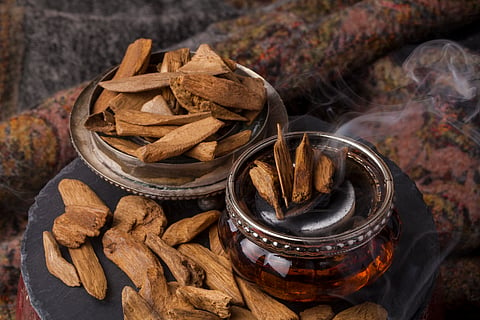

Lakhs of Indian farmers/growers will be benefited in exporting Agarwood (Aquilaria malaccensis) after India recently increased the quota for exports through the Convention of International Trade in Endangered Species of Wild Fauna and Flora (CITES).
Agarwood is prized for its aromatic and medicinal value. It is used in making incense sticks, essential oils and perfumes.
The species was decimated due to excessive harvesting from the wild in past decades. It is listed as Threatened under the International Union for Conservation of Nature (IUCN)’s Red List.
The tree has been listed in Appendix II of CITES since 1995. This means that while it is not threatened with extinction, a risk of that happening exists nevertheless.
In India, Agarwood grows wild mainly in protected areas of the Northeast. Its export from the country was banned until November 2021, but re-export was permitted.
The Government of India submitted a Non-detriment Findings (NDF) report to CITES in 2024. It stated:
“The absence of export quota for a long period, and other trade-related restrictions in India, caused an increase in informal trade/export of Agarwood chips, oil, powder, etc. to Middle Eastern and other countries. It also led to an increase in costs of Agarwood chips and oil in the global market as India is a major Agarwood trading nation with which most importing countries have long trade records.”
The document also noted some 1.25 tonnes of chips and six litres of oil/derivatives have been recovered from six Indian states between 2017 and 2021. According to the non-profit TRAFFIC’s 2023 report, Assam, Delhi, Kerala, Maharashtra, Telangana, and West Bengal reported incidents of Agarwood smuggling to Bahrain, Saudi Arabia, Kuwait, Thailand, and the United Arab Emirates.
A A Mao, Director, Botanical Survey of India co-ordinated the project, which was led by Avishek Bhattacharjee, Scientist ‘E’, BSI. The project was commissioned by the Union Ministry of Environment, Forest and Climate Change (MoEF&CC) in accordance with CITES requirements that a scientific body should assess the NDF.
As per the report, Agarwood is one of the most widely cultivated species in Northeast India, mostly Assam, Manipur, Nagaland, and Tripura. The study estimated at least 139.89 million (13.989 crore) Agarwood plants under cultivation/ plantation in non-forest areas show potential and possibilities for Agarwood industries in India. Based on the report, the government also established ‘zero’ export quota of Agarwood from the wild. The export from cultivated population is not detrimental for the survival of the species in the wild.
The report further stated that the estimated Extent of Occurrence (EOO) and Area of Occupancy (AOO) of the wild population of A. malaccensis in India are 91,986.607 sq km and 68 sq km respectively.
On the basis of the report, the Agarwood has been removed from the Review of Significant Trade (RST) and increase the export limit from the existing limit of 25,000 kg (chips and powder) and 1,500 kg (oil) to 1,51,080 kg and 7,050 kg respectively.
As per CITES document, in 2023 the species was put under RST for India along with four other Agarwood producing countries.
Due to removal of India from the RST in 2024, lakhs of people who are engaged directly or indirectly in Agarwood industry would be benefitted.
These people are engaged in cultivation, maintenance and management, harvest, processing, production, transporting, marketing, trade and export of chips, oil, and other value-added products of Agarwood.
The report suggested that the registration of Agarwood trees before harvest, as well as of processing units should be mandatory for effective management. It recommended state forest departments to initiate supply of healthy seeds and establishment of nurseries.
Importing and exporting Agarwood chips, oil, and logs/ timber should be monitored, verified and controlled to minimise informal trade. If the import and export is not controlled, increasing the legal export from India will be challenging despite having sufficient export quota.